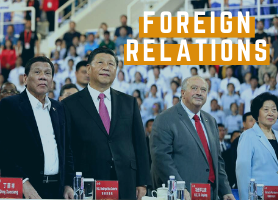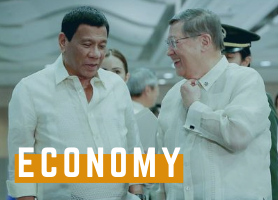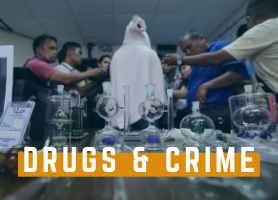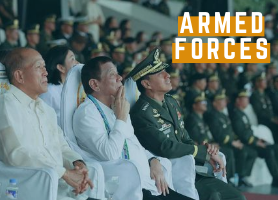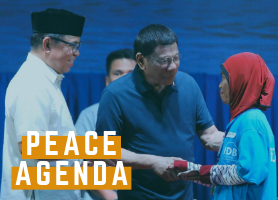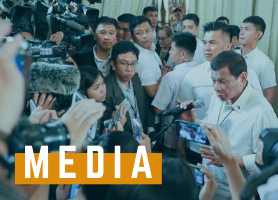The rising tensions with China in the West Philippine Sea hogged President Rodrigo Duterte’s fourth state of the nation address in 2019, where he promised two things that remain hanging to this day:
First, to assert the country’s rights over disputed maritime areas; and second, to seek compensation for the sinking of an anchored Philippine fishing boat by a Chinese vessel in Recto Bank (international name: Reed Bank) – an incident that almost killed 22 Filipino fishermen. (See VERA FILES FACT SHEET: The evolving statements on the Recto Bank allision: a visual timeline)
The Palace maintains that its friendly relations with China would benefit the country should the latter discover a cure for the coronavirus disease 2019 (COVID-19). This, amid criticisms that the administration acted belatedly in addressing the crisis for fear of diplomatic repercussions from China, where the outbreak first emerged. (See TIMELINE: PH GOV’T INITIAL RESPONSE TO COVID-19)
The Asian giant has also not stopped its aggressive actions to assert its debunked nine-dash line claim in the South China Sea despite the pandemic.
Prior to the virus outbreak, Duterte paid a second visit to Russia, which yielded 10 bilateral deals, including a memorandum of intent to explore possible construction of nuclear power plants in the Philippines.
The president also visited China, Japan, Thailand, and South Korea, where he and South Korean President Moon Jae-in inked four new agreements and a joint statement on a proposed free trade deal.
Duterte’s fourth year in office was also marked by his ban on all loan and grant agreements with Iceland and other countries that co-sponsored or voted in favor of the United Nations (UN) Human Rights Council resolution that sought to probe the human rights situation in the country.
He later reversed this order in February. (See VERA FILES FACT CHECK: Locsin changes tune on aid from UNHRC resolution signatories)
The president made a similar turnaround when he moved to end the country’s Visiting Forces Agreement with the United States (U.S.) that same month, then changed his mind when he suspended the termination for at least six months in June in light of “political and other developments in the region.” (See VERA FILES FACT SHEET: The Visiting Forces Agreement, explained, VERA FILES FACT CHECK: Duterte changes tune on terminating PH-US VFA)
Since the start of the COVID-19 pandemic, the Philippines has received aid—in cash or in kind, such as personal protective equipment for health workers, face masks, and other medical equipment—from neighbors and allies including Singapore, China, the U.S., Japan, Brunei, South Korea, and Taiwan.
See how the president has fared in his promises on foreign policy.
PROMISE: Assert rights over West Philippine Sea
|
|
“…I will [protect our territorial waters and natural resources] in a peaceful way…Let me assure you that national honor and territorial integrity shall be foremost in our mind, and when we may take the next steps in our smoldering controversy over the lines of our arbitral ruling, the West Philippine Sea is ours. There [are] no ifs and buts.” (SONA 2019) “Our improved relationship with China, however, does not mean that we will waver in our commitment to defend our interests in the West Philippine Sea.” (SONA 2018) |
|
A month after his fourth SONA, Duterte went on his fifth visit to China for his eight bilateral meeting with Chinese President Xi Jinping. The trip yielded six new deals, and the creation of a joint steering committee and a working group tasked to negotiate the terms on oil and gas development in disputed areas within the West Philippine Sea (the Philippine name for portions of the South China Sea adjacent to the Philippines). The committee held its first meeting on Oct. 28, 2019 in Beijing. Upon his return, however, Duterte said he and Xi had agreed to “ignore” the Philippines’ historic win on the South China Sea dispute at the Permanent Court of Arbitration (PCA) to pursue such “economic activity.” (See VERA FILES FACT CHECK: Duterte shifts from ‘invoking’ to ‘ignoring’ the PCA ruling) The 2016 PCA ruling invalidated China’s nine-dash line claim and declared certain features in the South China Sea to be within the Philippine exclusive economic zone. While Beijing continues to deny the validity of the arbitral ruling, retired Supreme Court Senior Associate Justice Antonio Carpio has said the signing of the memorandum of understanding and terms of reference for the oil and gas development was “implied admission” by China that the Philippines has exclusive sovereign rights over the disputed areas. Even amid the COVID-19 pandemic, China has not stopped from expanding its control over the South China Sea, including in areas within Philippine territory. On April 22, Foreign Affairs Secretary Teodoro Locsin Jr. said he filed two diplomatic protests against Beijing for two incidents:
In his intervention during the 36th ASEAN Summit, Duterte, without naming specifics, talked about “alarming incidents” in the South China Sea and called on parties to “refrain from escalating tensions and abide by responsibilities under international law.” The president, who also serves as the country coordinator for ASEAN-China Dialogue Relations, again pushed for the “early conclusion” of a code of conduct in the South China Sea. Carpio, who played a crucial role in the country’s victory at the Hague-based arbitral tribunal, has warned that Beijing will not sign a code of conduct until it has finished with its island-building activities. The former justice instead outlined several options available to the government to assert its rights over the West Philippine Sea — most of which involve working with other aggrieved parties, such as Vietnam and Malaysia. In a statement marking the fourth anniversary of the country’s victory, Locsin said the Philippines will not “compromise or change” its adherence to the arbitral award and called it “non-negotiable.” That being said, both Locsin and Presidential Spokesperson Harry Roque said the dispute is “not the sum total” of the two countries’ relationship. |
PROMISE: Exact liability, compensation in Recto Bank allision case
|
|
“They (China) wanted to talk, tapos ayaw dito (Philippines). And so, ‘So sige, we will investigate and you (China) investigate, and when you are ready, we shall meet and compare notes, and let us determine who pays for what damage.’” (SONA 2019) |
|
On Aug. 28, 2019, the same day Duterte left for his fifth visit to China, a Chinese fishing association issued an apology to the 22 Filipino fishermen on behalf of the owner of the Chinese vessel. (See VERA FILES FACT CHECK: Apology from Chinese association falsely claims Recto Bank is China territory) In its letter, the association “requested” the Philippine side to “file a specific appeal for the civil compensation based on the actual loss,” and committed to “urge” the Chinese shipowner to “actively coordinate with the Philippine side to expedite the latter’s claim for compensation.” More than a year since the incident, the issue has yet to be settled. In a June 22 interview with ANC, Locsin said both the Philippines and China, in separate investigations, have found that it was the privately-owned Chinese vessel at fault and that it was now up to the Department of Justice (DOJ) to determine the amount of damages to be paid. However, following Locsin’s interview, Justice Secretary Menardo Gueverra told reporters he does not remember the DOJ being assigned to perform such task, but will be “happy to help.” The justice secretary then said he had already given instructions to the provincial prosecutor’s office nearest the place of residence of the affected fishermen to “gather necessary information.” The Chinese Embassy in Manila in a June 30 statement said it has been “working closely with the Philippine side to solve the case,” adding that the concerned Chinese fishing association had “already offered a compensation proposal” and is “waiting for formal feedback.” |
Sources
RTVMalacanang, State of the Nation Address (SONA) 2019 07/22/2019, July 22, 2019
Senate of the Philippines, Senate Resolution 362, April 16, 2020
Rappler, Filipinos slam gov’t, demand China travel ban amid 1st coronavirus case in PH, Jan. 30, 2020
Rappler, Even with coronavirus scare, no mainland Chinese travel ban for now – Duque, Jan. 29, 2020
Rappler, Beijing continues South China Sea aggression during pandemic, May 13, 2020
Inquirer.net, Analyst says COVID-19 pandemic not slowing China conquest of South China Sea, April 14, 2020
CNN Philippines, COVID-19 not stopping ‘steady increase of Chinese harassment’ in South China Sea, April 14, 2020
ABS-CBN News, Philippines, Russia ink 10 business agreements, Oct. 4, 2019
Inquirer.net, Duterte flies back to PH after 5-day Russia visit, Oct. 6, 2019
CNN Philippines, Philippines, Russia agree to explore possible building of nuclear power plants, Oct. 5, 2019
Rappler, 5 PH-South Korea deals signed, but no free trade agreement yet, Nov. 26, 2019
Inquirer.net, PH, Korea to firm up free-trade deal, Nov. 26, 2019
Philstar.com, Philippines-South Korea sign 4 agreements during Duterte visit, Nov. 25, 2019
United Nations Office of the High Commissioner on Human Rights, A/HRC/41/L.20 Promotion and protection of human rights in the Philippines, July 5, 2019
Memorandum lifting UNHRC signatory aid ban, Feb. 27, 2020
Teodoro Locsin Jr. official Twitter account, “@DFAPHL The Deputy Chief of Mission of the Embassy of the United States has received the notice of termination of the Visiting Forces Agreement…,” Feb. 11, 2020
Department of Foreign Affairs, STATEMENT: ON THE SUSPENSION OF THE PENDING TERMINATION OF THE PH-US VISITING FORCES AGREEMENT, June 3, 2020
COVID-19 aid
- Department of Foreign Affairs, PH RECEIVES MORE TEST KITS, PPES DONATION FROM TEMASEK FOUNDATION FOR COVID-19 RESPONSE, July 15, 2020
- Department of Foreign Affairs, TEMASEK FOUNDATION DONATES 100 OXYGEN CONCENTRATORS FOR IN SUPPORT OF PH’S COVID-19 RESPONSE, June 29, 2020
- Department of Foreign Affairs, PHILIPPINES RECEIVES COVID-19 TEST KITS AND VENTILATORS FROM SINGAPORE, March 28, 2020
- Department of Foreign Affairs, PH RECEIVES ADDITIONAL TESTING KITS, PPES FROM CHINA TO AID IN PH’S FIGHT AGAINST COVID-19, May 10, 2020
- Department of Foreign Affairs, DFA, DOH SEND OFF CHINESE MEDICAL EXPERTS ON PH’S COVID-19 FIGHT, April 19, 2020
- China Embassy in Manila, Ambassador Huang turned over China aid to Foreign Secretary Locsin to help fight COVID-19, March 21, 2020
- Department of Foreign Affairs, PHILIPPINES RECEIVES DONATION FROM USA, April 11, 2020
- Japan Embassy in Manila, “Our Warm Welcome to the Nagasaki University Medical Team!,” April 13, 2020
- Japan Embassy in Manila, Message from Japanese Ambassador HANEDA Koji, March 30, 2020
- Department of Foreign Affairs, PHILIPPINES RECEIVES COVID-19 TEST KITS FROM BRUNEI, April 9, 2020
- Department of Foreign Affairs, PH RECEIVES US$500K-WORTH OF COVID-19 TEST KITS FROM REPUBLIC OF KOREA, April 25, 2020
- Taipei Economic and Cultural Office in the Philippines, Taiwan donates PPEs to the Philippines to support the fight against COVID-19, June 17, 2020
- Rappler, LIST: Countries giving aid to Philippines during coronavirus pandemic, April 16, 2020
On asserting rights in WPS
- Presidential Communications Operations Office, President Duterte arrives in China for a five-day official visit, Aug. 29, 2020
- Presidential Communications Operations Office, President Duterte to Chinese counterpart: Let’s reaffirm value of our relations, Aug. 30, 2020
- Teodoro Locsin Jr. official Twitter account, “Chinese FM Wang Yi’s & my MOU on oil & gas exploration & development applies only in disputed areas…,” Sept. 11, 2019
- Official Gazette, Administrative Order No. 29, s. 2012, Sept. 5, 2012
- Department of Foreign Affairs, JOINT PRESS RELEASE: PH-CN JOINT COMMITTEE ON OIL & GAS DEV’T HOLD 1ST MEETING IN BEIJING, Oct. 30, 2019
- Foreign Ministry of the People’s Republic of China, Memorandum of Understanding on Cooperation on Oil and Gas Development between the Government of the People’s Republic of China and the Government of the Republic of the Philippines, Nov. 27, 2018
- Teodoro Locsin Jr. official Twitter account, “There is no one year deadline for specific project. Just best effort…,” July 7, 2019
- RTVMalacanang, Oath-Taking Ceremony of the Malacañang Press Corps (MPC), Presidential Photojournalists Association (PPA), and Malacañang Cameramen Association (MCA), Sept. 10, 2019
- Permanent Court of Arbitration, PRESS RELEASE: THE SOUTH CHINA SEA ARBITRATION, July 12, 2016
- Permanent Court of Arbitration, South China Sea Arbitration Award, July 12, 2016
- Chinese Embassy in Manila, Statement by the Embassy of the People’s Republic of China in the Philippines, July 13, 2020
- Teodoro Locsin Jr., “At 5:17 pm today the Chinese embassy received 2 diplomatic protests…,” April 22, 2020
- Xinhuanet.com, China’s State Council approves establishing of two districts in Sansha City, April 18, 2020
- Western Command Armed Forces of the Philippines, WESCOM clarifies the recent incident between Phil Navy and PLAN vessel within Philippine Waters, April 22, 2020
- Philippine Information Agency, ASEAN reaffirms importance of rule of law in South China sea, July 1, 2020
- Presidential Communications Operations Office, Intervention of President Rodrigo Roa Duterte at the 36th Association of Southeast Asian Nations (ASEAN) Summit, JUNE 26, 2020
- Presidential Communications Operations Office, President Duterte calls on ASEAN to resolve territorial dispute in South China Sea, Nov. 2, 2019
- ABS-CBN News, China troll army, massive funds could influence 2022 polls: ex-Justice Carpio | ANC, June 10, 2020
- Department of Foreign Affairs, STATEMENT OF SECRETARY OF FOREIGN AFFAIRS TEODORO L. LOCSIN, JR. ON THE 4TH ANNIVERSARY OF THE ISSUANCE OF THE AWARD IN THE SOUTH CHINA SEA ARBITRATION, July 12, 2020
- Department of Foreign Relations, SECRETARY LOCSIN, CHINESE STATE COUNCILOR AND FOREIGN MINISTER WANG YI HOLD VIRTUAL TALKS, July 15, 2020
- Presidential Communications Operations Office, Press Briefing of Presidential Spokesperson Harry Roque, July 14, 2020
On Recto Bank incident
- Department of Foreign Affairs official Twitter account, Chinese Apology on the Recto Bank Collision Incident, Aug. 28, 2019
- ABS-CBN News, Saudi Arabia asks PH to bring home bodies of deceased OFWs | ANC (22 June 2020), June 21, 2020
- ABS-CBN News, Guevarra orders prosecutors to determine any compensation for GEM-VER fishermen, June 22, 2020
- CNN Philippines, DOJ to assist in deciding on compensation amount for crew of sunken PH boat, June 22, 2020
- Manila Bulletin, DOJ tapped by DFA to set amount due to Filipino boat owner, crew, June 22, 2020
- Chinese Embassy in Manila official Twitter account, “The Embassy also noted that a few Philippine media reported again the fishing vessels collision…,” June 30, 2020
(Guided by the code of principles of the International Fact-Checking Network at Poynter, VERA Files tracks the false claims, flip-flops, misleading statements of public officials and figures, and debunks them with factual evidence. Find out more about this initiative and our methodology.)
